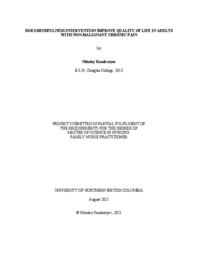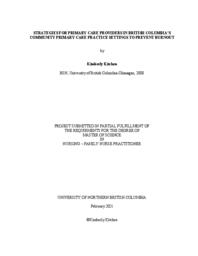Booth, Colleen
Person Preferred Name
Colleen Booth
Related Works
Content type
Digital Document
Description / Synopsis
Chronic pain is a significant problem that negatively affects quality of life resulting in distress, disability, and inappropriate prescription of analgesics. Primary care providers need evidence for non-pharmaceutical tools, such as mindfulness-based intervention, to manage the complexities of chronic pain. The purpose of this integrative literature review is to investigate the impact mindfulness may have on the quality of life of subjects with chronic pain. A background of relevant information is presented regarding chronic pain, quality of life, and mindfulness. Thereafter, a comprehensive search revealed 14 studies in this integrative literature review. Key findings include that there is low to moderate quality evidence that mindfulness improves QOL, especially in the domains of mental well-being. Overall, mindfulness can be an effective tool for individuals that are currently on pharmacological monotherapy. The study concludes with recommendations for future research and practice.
Origin Information
Content type
Digital Document
Description / Synopsis
Primary care providers (PCPs) suffer from high rates of burnout. Burnout is the result of chronic workplace stress. Burnout can significantly impact the PCP’s personal and professional life and can lead to devastating consequences. Literature often addresses organization level strategies to improve burnout rates but there is a dearth of literature focusing specifically on PCP-directed strategies to prevent burnout. Using Whittemore and Knafl’s (2005) method for integrative literature reviews, ten articles were reviewed. Results suggest that PCPs can reduce burnout by building a strong professional community. Additionally, the results suggest that burnout may be prevented by strengthening one’s personal resources via positive emotions. Recommendations for building a strong professional community and strengthening the PCP’s personal resources are discussed and specific strategies PCPs can implement are presented.
Origin Information
Content type
Digital Document
Description / Synopsis
Primary care providers (PCPs), including nurse practitioners and primary care physicians, experience significant occupational stress, putting them at risk for chronic stress and burnout. Burnout rates are high amongst PCPs, and results in negative health effects that can impact the personal life of the PCP, as well as professional outcomes and patient care. Mindfulness has been shown to reduce anxiety and burnout symptoms, and improve healthcare provider well-being. Using an integrative literature review methodology outlined by Whittemore and Knafl, this paper explores if a mindfulness practice can reduce stress and burnout symptoms for PCPs. The results are discussed within the context of a primary care setting in Canada. Relevant literature was searched and a selected sample of ten primary research articles was selected for further analysis. Results suggest that mindfulness interventions are effective for reducing stress and burnout symptoms for PCPs, but access to these interventions may be a barrier to successful implementation of a mindfulness practice. In a primary care setting in Canada, PCPs are encouraged to attend mindfulness interventions and incorporate learned components into their practice, thereby increasing patient-centered care. Recommendations for reducing stress and burnout symptoms for PCPs are discussed, and specific strategies for successful implementation of mindfulness interventions are provided.
Origin Information



